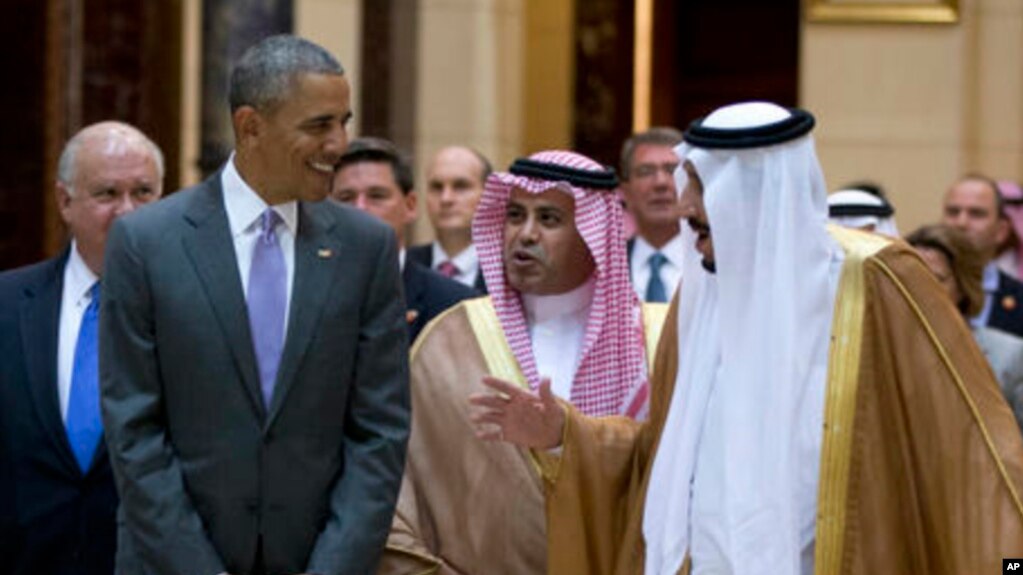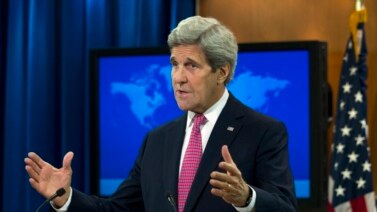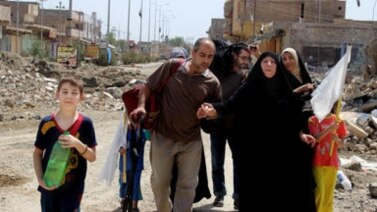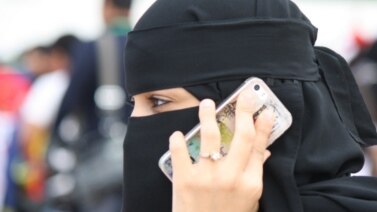
President Barack Obama sat down Wednesday with King Salman of Saudi Arabia in Riyadh.
The meeting comes at a time of difficult relations between the two countries.
The Saudi government has concerns about the U.S. nuclear deal with Iran and the Obama administration policy toward the Syrian civil war.
Obama has said Saudi Arabia has not done enough to fight terrorism in the Middle East. He called the Saudis “free riders,” suggesting they gain from United States security efforts without sharing the responsibility.
Another issue is the possible release of U.S. documents that might point some blame at Saudi officials for the September 11, 2001 terrorist attacks. Saudi officials strongly deny this.
The president and King Salman shared friendly comments at the start of their meeting Wednesday at the Erga Palace.
The president thanked the king for his “hospitality,” and for organizing a six-nation Gulf summit meeting on Thursday.
“I and the Saudi people are very pleased that you, Mr. President, are visiting us in the kingdom,” King Salman said.
Still, King Salman did not meet President Obama at the airport, as he has done for other leaders.
U.S. Defense Secretary meets with Gulf leaders
Also in Saudi Arabia is U.S. Secretary of Defense Ash Carter.
At a press conference, Carter called on Gulf nations to do more in the fight against the Islamic State. He also asked the nations to work with the U.S. to stop what he called Iran’s “destabilizing” behavior.
However, it will be hard to settle basic disagreements between the United States and Gulf leaders. They disagree on what the major concerns should be.
The United States and much of Europe see Islamic State and al-Qaida as major dangers.
But Gulf leaders worry more about Iran and the people and groups it supports. That includes Syrian President Bashar al-Assad and Shi’ite Houthi rebels in Yemen.
Meeting in Saudi Arabia are leaders from the United States and the six Gulf States. They include Kuwait, the United Arab Emirates, Qatar, Bahrain, Oman and also the Saudi Kingdom.
Obama administration spokesman Josh Earnest was asked about a secret 28-page document that may point to Saudi involvement in the 2001 terrorist attacks.
Earnest said no matter what the documents show it is clear that “since 9/11 we have seen the Saudi government” work to combat terrorism.
Rob Malley is the U.S. top adviser for the Middle East and North Africa. He offered his views on what will come of the meeting between Obama and King Salman.
“The differences are not going to disappear, but our work together is not going to disappear either,” Malley said. “In fact, I think this summit will show how much has been accomplished over the last year and how much more can be done in the coming months.”
But Michael Rubin, a Middle East expert with the American Enterprise Institute, said he does not expect much more than “polite” comments.
He said that the Obama presidency is nearing its end and that Saudi and other Gulf leaders “are more likely” looking ahead to what policies to expect from the next U.S. president.
Mary Alice Salinas and Carla Babb reported on this story for VOANews.com. Bruce Alpert adapted this story for Learning English. Mario Ritter was the editor.
We want to hear from you. Write to us in the Comments Section or share your views on our Facebook Page.
Words in This Story
hospitality – n. generous and friendly treatment of visitors and guests
destabilizing – adj. to cause a government to be unable to continue existing or working in the usual or desired way
summit – n. a meeting or series of meetings between the leaders of two or more governments
accomplish – v. to get something done


